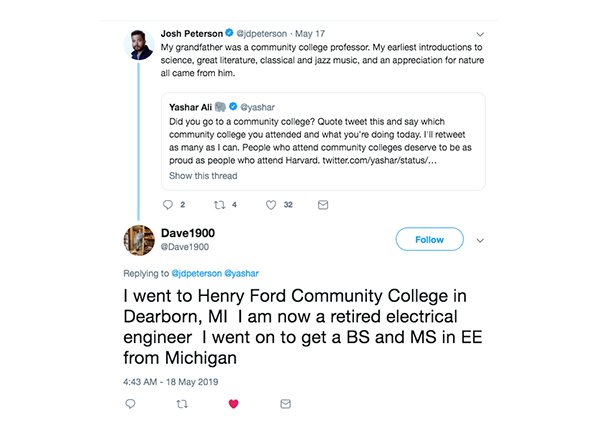Retired engineer "learned how to learn" at HFC

Dave Davis, a retired electrical engineer who lives in Fairfax, VA, has good reason to be proud of the education he received at HFC in the 1960s. HFC proved to be more than an excellent starting point for the rest of his education and for his engineering career.
Davis, who lived with his grandparents at 6432 Yinger in Dearborn – a stone’s throw from the College – decided to attend HFC after graduating from Fordson High School in 1963 because of its proximity, affordability, and good reputation.
“The College focused on pre-engineering with a concentration in mathematics,” said Davis. “One of the main things I got out of HFC: I learned a lot about calculus, which is important in an engineering education. I learned how to study really well. I learned how to be a good student. It was good preparation for my next few years in college and my master’s degree.”
Davis transferred to the University of Michigan-Dearborn, where he earned his bachelor’s in electrical engineering (EE) in 1968. He went on to earn his master’s in EE from the University of Michigan in Ann Arbor in 1970.
Silicon Valley
Davis enrolled in the co-op program at UM-Dearborn. The university was on a trimester system back then. Every other trimester, he would work in the engineering field. One of his earliest jobs through the co-op program was designing missiles for Lockheed Missiles and Space Company (LMSC), a unit of the Lockheed Corporation in Sunnyvale, CA.
“I worked in Silicon Valley before it was called Silicon Valley. I was there before Intel was founded,” recalled Davis with a laugh. “A lot of young men worked in Lockheed in the late 1960s because of the aerospace industry. Back then, housing was affordable. On weekends, I’d drive up to San Francisco to explore the area.”
After earning his master’s degree, Davis worked as a hardware systems engineer for Western Electric, focusing on the Safeguard Program, the U.S. Army’s anti-ballistic missile (ABM) system.
“My job was to work out the bugs from the ground control computers,” recalled Davis. “That was a terrific project to be on. I learned a lot.”
Developing diagnostic software for Ford
As his career progressed, Davis worked for aerospace manufacturer McDonnell Douglas, Michigan Bell, and Ford Motor Co.
“Ford was interested in me because I knew COBOL, which was the second generation of computer languages designed for business use. I developed a computer-controlled electronic device that would test what was going on under the hood of a car, such as a dead battery. I’m proud that I developed a piece of a program that would measure the average current going into the starter motor of a car when you turned the ignition. Ford’s upper management got concerned about making their cars too complex for typical mechanics to diagnose and repair. This would provide them with a tool to help them out. This was the forerunner of building diagnostic software into a car’s internal computer,” he explained.
Changing with the times
Davis spoke about how the engineering field changed over the years and how he had to change with it. He transitioned from a hardware systems engineer to a software systems engineer. He noted that many colleges and universities don’t offer EE degrees per se anymore; they offer EE/computer science, EE/computer engineering, or EE/software development.
“The EE profession has developed into a combination of an electrical engineering and a software degree,” he said. “We’re living in a gig economy. In the last 10-15 years, it feels like I’ve lived in a gig economy for techies. You get hired at a company for a certain project, not a career. When those projects are over, you get laid off. There aren’t many benefits, either. You have to do your own career planning to identify the next project you’ll be working on.”
Still, he looks back on his engineering career with great fondness, as well as his HFC days.
“That College was vital to when I was starting out. It was better than going to U-M in Ann Arbor. I could practically walk to (HFC) and UM-Dearborn,” he said. “One of the key things I got out of my education at the College is the ability to learn. And I continue to learn to this day about a variety of subjects, including history, quantum mechanics, and numbers theory. HFC showed me I can handle anything school can throw at me.”
